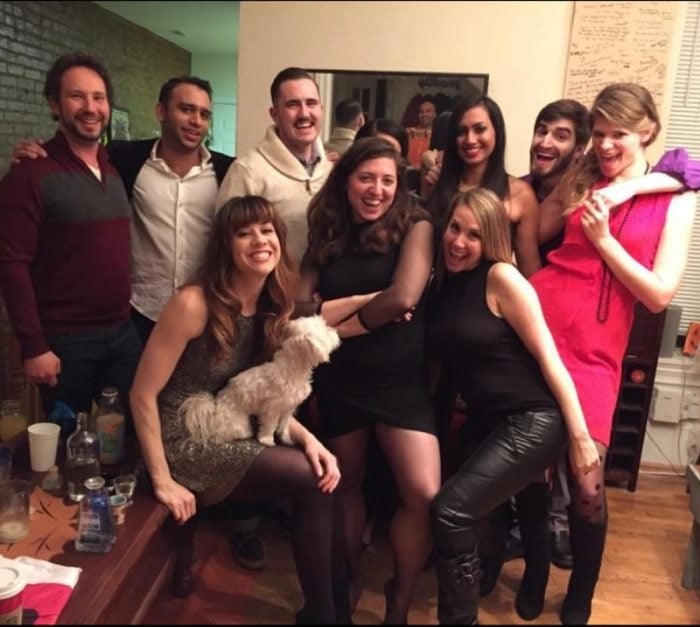Once upon a time, I lived in Washington, D.C., in a fabulous apartment right in the heart of the city.
My sole housemate traveled so often for work she was hardly ever home, so I basically had the place to myself.
Sounds ideal, right? Sure, except I was lonely. I cried a lot and had a general sense of malaise. As an extrovert, I was wilting.
I knew I wanted a different arrangement but didn’t quite know how to get there. When I asked myself, “What would be even better than what I have now?” the answer was: “I want to live with people. I want a big, fun, fabulous group house.”
But as soon as this dream popped in, I got nervous. How would I ever find five or six people who all also wanted to do that kind of thing? Who also needed a place to live at exactly the same moment? People had leases. They had partners. Even if they thought it was a cool idea, would they be willing to make changes or sacrifices to actually do it?
It seemed impossible.
Then I did something brave: I started telling safe people about my dream.
“I want a community house,” I announced to two good friends while we were getting coffee that weekend. “A fun place where we can all live and hang out, and where we have a house dinner once a week and talk about stuff. I want it to be super fun and also organized.”
Despite these being friends whom I knew to be supportive, I fully expected to be shot down. I thought they’d say things like:
“Well that’s nice and all, but it’s never going to happen.”
“Uh, I don’t think that’s very realistic.”
“Good for you, but do you actually think that’s reasonable?”
Instead, both of their eyes lit up.
“Cool!” one said. “I could be down for that. Do you know what neighborhood you’d want to be in?”
“I really admire you,” the other added shyly. “I don’t know that I’d want to do that, but you seem like the perfect person to put it together.”
Encouraged, I kept sharing. And life organized around the idea. Another friend jumped on board and posted about the idea to several big list-servs. People responded saying they’d been wanting something similar for a while. We hosted a dinner so we could all meet in person, and had a great time.
Eventually, the core group emerged. There were seven of us who were serious about the concept, and each was willing to either break a lease or figure out how to be flexible about move-in. One young woman lived with her parents at the time, so was especially motivated.
For weeks, in duos, trios, and sometimes quartets, we explored different spots around the city. This was both bonding and made for amusing email exchanges like:
“So, the house that Brian and I saw tonight had, what we will call, ‘potential.’
However, it also had:
>> a locked room that would remain locked if we lived there. Brian and I are convinced the only rational reason for this is that it was filled with dead bodies.
>> each room was filled with furniture, that happened to smell like dead bodies.
>> a basement that was ‘off limits.’ I think we all know, at this point, why that was.
I could go into more reasons why we will not be pursuing this one, but I think I’ll just save us all some time and leave it at that.”
It took us about seven weeks, but eventually we found the right place. And after we’d signed the lease, moved in the furniture, set up the sound system, and bought the booze, we threw a huge party. A big, fun, fabulous party.
About five months after speaking my dream aloud, I lived somewhere significantly more fun, connected, amusing, and uplifting than where I’d been.
When we’re feeling low or run-down, it’s easy to go into the negative. Our brains are wired to plan for the worst-case scenario, and you’re not alone if you’ve ever “fantasized” about all the ways things could go wrong. For me, this has been especially true when there big changes were afoot—i.e. I’d gotten fired, evicted, or dumped.
But if you want to be a conscious creator in your life, you must resist this. You’ve got to spend the energy it takes to shift your awareness. I’ve found it useful to ask:
What would be even better than this?
Then feel into the answer. Breathe it in. As much as you can, experience the emotions you will have once you have this.
Then—and this is the hard part—you’ve got to tell safe people about it.
Look, it’s humbling to dream. Trust me, I know. It’s even more tender to actually talk about our dreams out loud. There’s a deep and transparent sensitivity in sharing what we truly want because there’s a possibility we might not get it.
We do lots and lots of things to avoid this discomfort. My personal go-to is to just give up on the dream right away.
It’s impossible. It’ll never happen. It’s too expensive. It’s too complicated. I’ll never find other people who are as committed to this as me. I’ll never find people who are ready to live in a different way. Everyone just wants to do the white picket fence thing with their significant other. No one will be willing to take a risk. No one will want to.
I do this to protect myself from feeling let down. A part of me thinks that if I give up on the dream myself, it’ll be less devastating than being crushed by disappointment if it doesn’t happen.
But if I look back at my life, almost all the important things that I’ve allowed into my existence have been in part because I was courageous and shared what I wanted with others. It was uncomfortable every single time—and it was also transformative.
I still vividly recall sitting in Tryst, the cafe in Washington, D.C., at that table with two of my friends, waiting for an opening to tell them about my dream. I remember clearing my voice and saying, “So I’ve got a thing.”
At which point they looked at me expectantly. And I thought, “Am I really going to do this? Am I actually going to give voice to this? I can’t take it back once I do. And then if I fail at it, they’ll know. They’ll witness me in my humiliation.”
I didn’t think any of this consciously, of course. All I knew was that my heart was beating fast and I felt like I was going to throw up. But I stuck with it and blurted it out…and was glad I did.
This is a good moment to remind ourselves that if someone shares their dream with us, it’s critical to take a moment to appreciate the courage it took for them to reveal part of their heart.
This goes especially for the realists, who want to “help” by giving someone all the reasons why something might not work. It’s not that this skill isn’t valuable, but it’s not what you want to lead with. The first thing you want to do is encourage them. Then you can help with the rest of it.
The other thing is this: Over the course of my life, I’ve often tried to do everything myself. Let me tell you how well this works out:
It doesn’t.
Don’t get me wrong, I’m great at “making things happen.” But the truth is that I only really “make things happen” when I actively invite something greater into the picture.
You can call it life or God or the universe or Divine Intelligence or Great Spirit or the Field. It doesn’t matter. What I’ve seen again and again is that there is some force that seems to organize around what I put my focused, emotional attention on.
And I have to tell safe people about what I want.
I prayed my ass off to get that community house going. I didn’t call it praying; I called it visualization. I called it intending. I put energy into it almost every single day. I focused on how I wanted to feel in the house, how I wanted to feel in the community.
And I told safe people what I wanted.
According to research institute HeartMath, “The heart’s electrical field is about 60 times greater in amplitude than the electrical activity generated by the brain.” In other words, the electromagnetic field that emanates from the heart (a feeling) is 60x more powerful than the field that comes from the head.
This means that maintaining a positive feeling for one minute (60 seconds) is the equivalent of thinking about something for an hour. Intending, visualizing, and imagining having what you want is incredibly powerful.
It’s also not enough. You need to share what you want with others. It’s like a rite of passage—telling your community about what you’re shooting for is part of the equation.
It’s almost like life wanting to know, “Are you really committed to this? Are you so committed that you’re willing to get uncomfortable?”
There are lots of platitudes about having a dream or following your dreams or dreaming something into existence. But we rarely talk about the vulnerability required to actually name your dream. To admit it to yourself first, then admit it to others.
Having a dream is vulnerable. Talking about it is even more vulnerable.
It’s also a big part of how dreams actually become manifest.
~


 Share on bsky
Share on bsky





Read 0 comments and reply